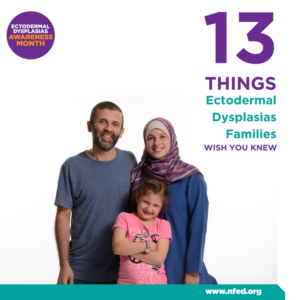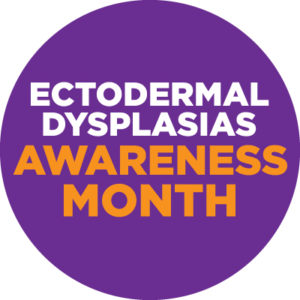 Helping others understand what it’s like to live with ectodermal dysplasias is one of our goals for Ectodermal Dysplasias Awareness Month. Here are 13 things some families affected by the rare condition wish you knew.
Helping others understand what it’s like to live with ectodermal dysplasias is one of our goals for Ectodermal Dysplasias Awareness Month. Here are 13 things some families affected by the rare condition wish you knew.
- I wish people knew that they all are braver than you think, stronger than they seem, and smarter than you think! Please be humble and kind to all God’s children! – Debbie, grandmother of four and a mother of a daughter affected by ectodermal dysplasia
- I wish people knew that the disorder doesn’t define the person you are or what you can do. I wish they knew that just because you have ectodermal dysplasia, you can still do everything everyone else does – maybe just a little differently. – Shay, mother of a son affected by ectodermal dysplasia
- I asked my grandson one day if it makes him said that he has hypohidrotic ectodermal dysplasia (HED) and his response was and I quote, “Why would it make me sad to be me?” The raw truth from a four-year-old. These children bare so much, but no different when you are just wanting to be a kid. – Rachel
- I wish others knew the challenge of walking. Most choices I make throughout my days are based on how much continuous walking I will have to do. Most others seem to not understand (understandably so) the pain I experience just going on a stroll. – Cody, affected by ectrodactyly-ectodermal dysplasia-clefting (EEC) syndrome
- Outdoor temperature can be an issue. When it is hot outside, my son’s scalp and skin get very itchy and uncomfortable. It makes outdoor activities in warm weather really unenjoyable for him. – Nancy, mother of son affected by EEC syndrome
- I wish everybody knew, that when you have tears in your eyes, you are not always crying! You just have no tear ducts. – Tuuli
- We can be successful accomplished adults with full lives. – Jill, affected by HED
- I wish people understood how serious not being able to sweat truly is. I get “I wish I didn’t sweat all the time” when explaining it to people. I know they don’t know but it still kind of gets to me to hear it when it can be so dangerous to my little ones. – Heather
- It is sometimes an “invisible” condition for me. People see me as doing normal activities. Or they see my toddler and, aside from his teeth, don’t think anything differently. There are lots that go on behind the scenes people don’t see or know about! – Beth, affected by HED
- It has been in my family for generations, so has become part of my genetic identity. However, it also means I am an honest to goodness mutant, with all that term implies. I move through the world in a fundamentally different way than you do. That doesn’t make me less valuable, I have offsetting talents that make the world a richer place to live in, for all of us. Courage, determination, compassion, humility, faith, and most important of all, LOVE. The ultimate equalizer. – Carolyn, affected by HED
- That having EEC can be lonely when you’re 10 yet filled with friends when you’re 50. That one can break through the barriers, self-imposed or those of others, to fulfill your dreams; a loving spouse, a family, a career. Is it easy? No. Can obstacles be overcome? Yes. Are there people to guide you and mentor you on your journey? Absolutely. Your parents, your friends, and our NFED family! – Jack, affected by EEC syndrome
- I wish people knew it wasn’t appropriate to ask, “What’s wrong with his teeth?” It gets exhausting having to tell people that there is a better way to phrase their question than “What’s wrong?”. – Melissa Ann, parent of a child affected by ectodermal dysplasia
- That it’s not a death sentence. It’s not cancer. – Denyse, affected by ectodermal dysplasia
What Do You Wish?
If you or someone you love is affected by ectodermal dysplasias, share something you wish others knew in the comment fields below. We’d love to hear your experience.
Share Your Story
I wish people understood that having EEC is what makes me, me! Being affected with a rare condition gives us a greater sense of empathy and understanding to the struggles that others go through.
I wish people knew that “I’m so sorry” seems like such a silly response to me when I share our story of life with Ectodermal Dysplasia!! Yes, our daily lives, our struggles, and our modifications make life more difficult than ones life who is not affected with HED. BUT!!! Those daily struggles ( or strength and character builders, as I like to call them) present the opportunity to be stronger, more determined, successful, compassionate people!!! This has given my children the learning curve to be strong, adjust, adapt, and overcome at a very early age!! Some people go a lifetime without these lessons!! So don’t be sorry for something we are thankful for, daily!!! ❤
In 1972 I asked my sister, “Did you ever wish you were different?” She said “No, I like myself just the way I am! I just wish everybody else did…”.
I wish people wouldn’t look at me and think I’m dumb, a freak, contagious, etc.. I’m a human being just like you. I wish those of us affected by ED, could be treated with more respect. GOD chose to give us these challenges because be believes in us.